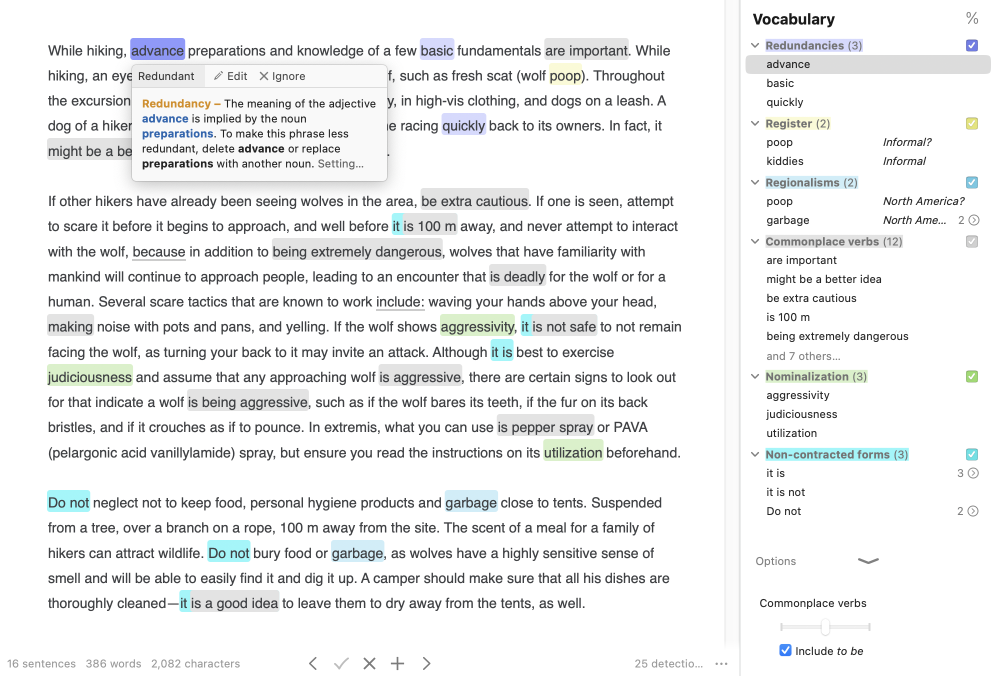Vocabulary
Words convey our thoughts, and we need to choose them carefully so they reflect those thoughts as accurately as possible. Antidote will draw your attention to the following: certain classes of words in your text that may be problematic and which you will generally want to avoid, including redundancies and words that may be inappropriate or offensive; regionalisms and words that belong to a particular register, which you will also want to review; and certain commonplace verbs, which you may want to liven up. If you need to make a substitution, you can quickly replace a questionable word in a single click with the Synonyms command in the tooltip. You can also double-click the word in question or select Synonyms of “word” from the context menu (right click).
-
 BA1234C
BA1234C
- The vocabulary problems that Antidote flags (except for commonplace verbs) depend on your language settings. If necessary, click Setting in the tooltip to change the setting for a specific detection type. Note that the new settings will also apply to the Language view’s analysis of the text.
Redundancies
A redundancy is an expression whose meaning is unnecessarily repetitive (e.g. young puppy, free gift, added bonus). They are best avoided!
Register
A word that belongs to a non-standard register is likely to strike a false note in your text. The word may be the result of a deliberate stylistic choice, or it may be a mistake, in which case you will probably want to replace it with a neutral synonym.
Offensive
The corrector draws your attention to words that could be considered offensive (slurs, insults, vulgar terms, etc.). Make very sure their use is justified in your text.
Regionalisms
Employing a word or phrase whose use is limited to a particular linguistic region can increase the risk of misunderstanding. Antidote allows you to quickly spot words that are specific to a given English-speaking country, such as Canada, the US, the UK and others.
Commonplace verbs
The verb expresses the action of a sentence, serving to link the subject and the object. Therefore, the verb has an important role to play: it has to make a good impression on the reader. Antidote will locate “dull” or “empty” verbs in your text and those that are overused, so you can replace them with “full” verbs that carry a distinct and precise meaning. So instead of writing She is doing an experiment in nuclear medicine, you might prefer She is conducting an experiment in nuclear medicine.
- The verbs be and have are not included among commonplace verbs when they function as auxiliaries.
- A slider lets you adjust the filter’s sensitivity to flag all the commonplace verbs in your text or, for faster processing, only the most flagrant cases. See the tooltips associated with each of the slider’s positions to help you decide which one best suits your needs.
- The verb to be is extremely frequent, and in many constructions it is difficult to find a synonym for it. Antidote therefore allows you to exclude it by unticking the Include to be checkbox.
Nominalization
Nominalization is the use of nouns that are derived from verbs or adjectives. Excessive nominalization, particularly when the verb or adjective is much more common than the noun, can weigh down a text or make it harder to understand.
Non-contracted forms
Careful use of contractions (e.g. haven’t, won’t), as opposed to non-contracted forms (e.g. have not, will not), can help your text flow smoothly.